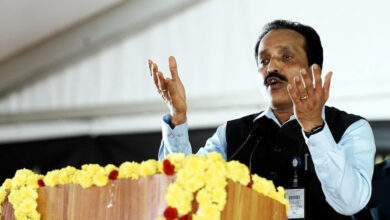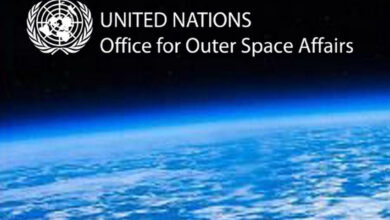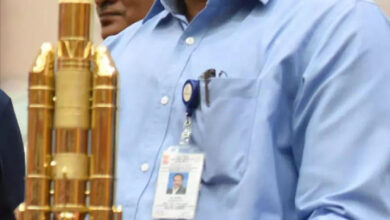Indian Air Force Releases Video Footage of Gaganyaan Astronauts Training
The video shows Gaganyaan astronauts engaged in intensive workouts
By R. Anil Kumar
Bangalore, October 8. The Indian Air Force (IAF) shared a clip that shows the astronauts selected for Gaganyaan mission in intense workout mode, In preparation to the highly anticipated Gaganyaan mission, in what is the first-ever official glimpse of the Indian astronaut candidates undergoing strenuous training session in Bengaluru, for the first ever human space-flight mission undertaken by India.
For the first time, we got to see the astronaut/vyomnaut designates for #Gaganyaan's first crewed mission in a video posted by IAF yesterday! #ISRO
These two will be the first Indians to be launched to space on an Indian rocket from Indian soil! 🇮🇳
For now, their… pic.twitter.com/98yoGkHjmJ
— ISRO Spaceflight (@ISROSpaceflight) October 4, 2023
These four Indian Air Force pilots have been selected after vigorous rounds to undertake the ISRO’s Gaganyaan Human Spaceflight Mission to Low Earth orbit.
On the Earth’s surface we experience ‘1g’ force, that is the ordinary gravitational pull.
These astronauts are featured in the video clip that was raised by the IAF as part of the 91st Indian Air Force Day Celebrations.
The Indian Air Force video clip offering a glimpse of the astronaut candidates comes ahead of the 91st Indian Air Force day that is celebrated on October 8th.
Selection of Astronauts
Four Indian pilots had been screened and handpicked after multiple rounds of testing and scrutiny to undertake ISRO’s Gaganyaan Human Spaceflight Mission to the Lower Earth Orbit (LEO).
Since India does not have an exclusive pool of astronauts, the best option is to select and pick the ideal candidates from Indian Air Force pilots, who are accustomed to bearing the high ‘g’ force experienced during complex aerial manoeuvres.
What is “G” Force
All Humans on Earth’s surface experience 1g force, which is the ordinary pull of gravity. During rapid acceleration or deceleration of an aerospace vehicle, this force is manifested and denoted by the number preceding the “g.” Simply put, the phenomenon is referred to as g-force or acceleration due to gravity.
Given the nature of their profession, fighter pilots are trained to take sustained loads of g-force, thereby making them better suited for undergoing training for astronaut missions.
Indian Astronaut candidates had already completed a round of training at Russia’s Gagarin Cosmonaut Training Centre and are undergoing simulator and theoretical training in India.
The astronauts had also visited the ISRO’s lead centre, Vikram Sarabhai Space Centre, in Kerala’s Thiruvananthapuram earlier this year.
The VSSC, which is responsible for conceptualising, designing and developing all space transportation systems for the country, is preparing crew modules that will house the astronauts.
INDIA-US HUMAN SPACEFLIGHT COLLABORATION
This year, during Indian Prime Minister Narendra Modi’s state visit to the United States, the US President Joe Biden announced a mission to launch Indian astronauts to the International Space Station in 2024 and mentioned it as a collaboration on Human Spaceflight.
This also means that Indian astronauts would train at the Johnson Space Centre in Texas, USA.
The Indian astronaut mission to the ISS is expected to serve as a precursor to the Indian Gaganyaan mission and offer valuable insights and practical lessons on living and working in space.
This is crucial, given how the first and only Indian astronaut Wing Commander Rakesh Sharma who had travelled to space did so as part of the Soviet Interkosmos programme in 1984.
ISRO-CREW MODULE ABORT TEST
The Indian Space Research Organisation is entering a critical phase in its preparation for the Gaganyaan Mission. The focus of attention now is the impending in-flight abort test of the Crew Escape System (CES), a pivotal component ensuring astronaut safety during launch emergencies.
By the end of this month, ISRO is expected to perform the maiden in-flight abort test of the Gaganyaan crew module.
The crew module would be mounted atop a mini-rocket named ‘Test Vehicle’ and launched to an altitude of 11-14km.
On reaching the designated altitude and flight parameters, the crew module would be ejected from the rocket and carried to a safe altitude away from the rocket, and then deploy parachutes for a splash down in the Bay of Bengal.
This test is similar to a fighter pilot ejecting from a fighter aircraft that is in extreme danger.
In the astronaut mission, in case there is an issue with the rocket carrying the astronauts, the crew module would have to eject itself to safety and protect the astronauts nestled within.
This is a crucial test ahead of the maiden unmanned flight of the actual Gaganyaan mission that ISRO hopes to undertake by March 2024.
After a series of successful uncrewed flights, ISRO would be undertaking the astronaut mission.





